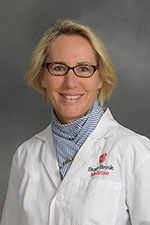Ute Moll, MD, MS 
Distinguished SUNY Professor
Endowed Renaissance Professor of Cancer Biology
Stony Brook Medicine
MART Building – Level 8
Stony Brook NY 11794-7283
Tel: (631) 216-2820
Email: Ute.Moll@stonybrookmedicine.edu
Clinical Practice:
Dr. Moll currently participates in the autopsy program at Stony Brook University Hospital.
| Education: | |||
|---|---|---|---|
| Institution & Location | Degree | Year(s) | Field of Study |
| University of Ulm, Germany | MS | 1980 | Biology |
| University of Ulm, Germany | MD | 1985 | Medicine |
Research Summary:
Dr. Moll is a physician scientist at Stony Brook University and a leader in the field of the p53/p63/p73 gene family, studying their function and regulation in cancer, normal development and tissue homeostasis. She is board certified in Anatomical and Clinical Pathology and maintains part-time clinical duties in the Dept. of Pathology at SBU. She is the senior Principal Investigator of a continuously productive, well-funded research laboratory, and completed numerous successful projects with uninterrupted grant support from the National Cancer Institute, the National Heart, Lung, Blood Institute and other national foundations. Dr. Moll has broad experience in querying biological systems to decipher mechanisms of disease, ranging from human tissues, advanced cell culture to genetic mouse models that her lab engineers. She uses a broad range of multi-omic molecular, computational, cell biological and biochemical methods. Her lab generates new knockin mice and uses compound genetic mouse models to answer biological questions in vivo. Her research is published in top-ranked scientific journals.
Her lab made seminal contributions to the important field of p53, the premier tumor suppressor that protects our tissues from becoming cancerous, as well as its subversive tumor-promoting role when p53 is mutated in cancer. She discovered two separate transcription-independent cell death functions of wild-type p53, unexpectedly taking place outside the nucleus at the mitochondria. In response to a broad spectrum of cell stress, p53 protein induces programmed cell death of damaged cells (apoptosis) directly at the mitochondrial outer membrane by physical interactions with members of the Bcl2 family which control mitochondrial permeability. Her lab also identified a critical role of hypoxia-accumulated p53 protein in the mitochondrial matrix in triggering oxidative necrosis and ischemic stroke by directly opening the inner mitochondrial permeability transition pore via CypD activation.
Conversely, p53 is the single most frequently mutated gene occurring in over 50% of human cancers. Here Dr. Moll’s work has a strong translational focus. With a mouse model containing a common human cancer ‘hotspot’ mutation, she definitively proved that such mutations not only lose their tumor suppressor activity, but in addition gain new tumor-promoting oncogenic functions (gain-of-function, GOF) in mouse and human cancers. In a series of seminal papers using autochthonous mouse models, she demonstrated that major cancer types all exhibit dependency on continuously producing high levels of GOF mutant p53 protein. She showed that this dependency is an Achille’s tendon and can be therapeutically exploited by genetic or pharmacological ablation of mutp53. This greatly extends animal survival. Thus, this paradigm-shifting work established GOF mutant p53 as an actionable cancer-specific drug target.
Her lab also identified the p73 gene as the master regulator of multiciliogenesis. Motile multiciliated cells have critical roles in our respiratory system and are essential for cleaning inhaled pollutants and pathogens from our airways.
Positions and Employment:
| 1986-1989 | Resident, Anatomic & Clinical Pathology, Stony Brook University |
|---|---|
| 1989-1990 | Postdoctoral Research Fellow, Stony Brook University, lab of Dr. James Quigley |
| 1991-1992 | Postdoctoral Research Fellow, Princeton University, lab of Dr. Arnold J. Levine |
| 1992-1997 | Assistant Professor, Department of Pathology, Stony Brook University |
| 1997-2001 | Associate Professor, Department of Pathology, Stony Brook University |
| 2009-2024 | Vice Chair, Research, Department of Pathology, Stony Brook University |
| 2002-present | Full Professor, Department of Pathology, Stony Brook University |
| 2012-present | Co-Director, Stem Cell Analysis Core, Stony Brook Stem Cell Facility |
Other Experience and Professional Memberships (selected):
| 1988-1989 | Chief Resident, Department of Pathology, Stony Brook University |
|---|---|
| 2007-present | Guest Professor, Department of Molecular Oncology, University of Göttingen, Germany |
Honors (selected):
| 2006 | Baldwin Award for Cancer Research, Stony Brook University |
|---|---|
| 2011 | Baldwin Award for Cancer Research, Stony Brook University |
| 2012 | Fusion Award, Stony Brook University |
| 2013 | Inaugural Excellence in Basic Research Award, School of Medicine, Stony Brook University |
| 2017 | Induction as Member, Association of American Physicians (AAP) |
| 2017 | SUNY Central Chancellor's Award for Excellence in Scholarship |
| 2018 | SUNY Distinguished Professor |
Click here for a list of PubMed publications:
Influence of Dr. Moll’s scholarly publications, Google Scholar Oct 2024
Cited by
All | Since 2019 | |
|---|---|---|
Citations | 35701 | 13040 |
h-index | 81 | 43 |
i10-index | 153 | 99 |
